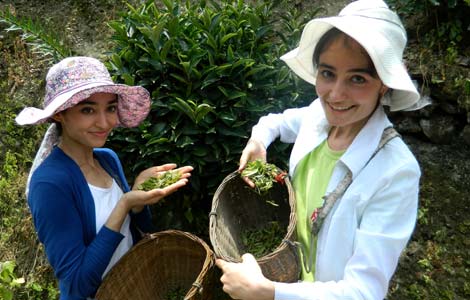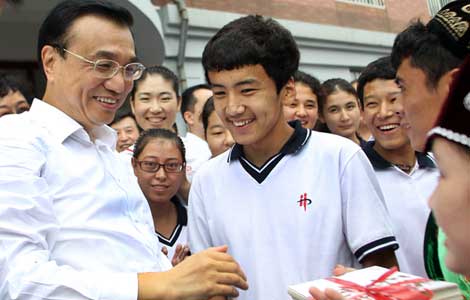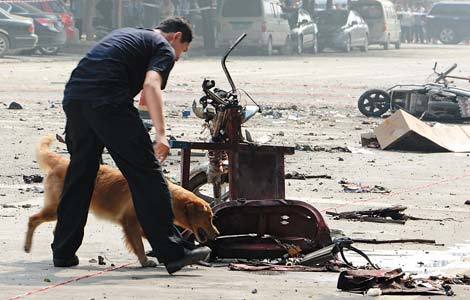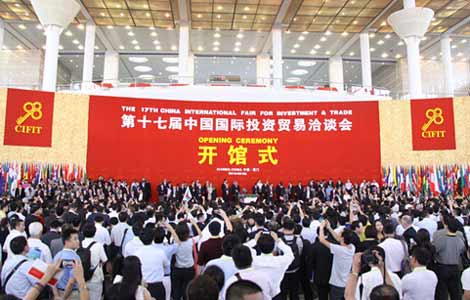Gifts do not make a teacher good
Updated: 2013-09-10 07:19
By Lisa Carducci (China Daily)
|
||||||||
When I came to China as a teacher in 1991, I was surprised to find that the country celebrated Teachers' Day on Sept 10. I thought it was a wonderful idea, especially because in my country, Canada, we had a Mothers' Day and a Fathers' Day, but no special day for teachers.
On Mothers' and Fathers' days, children pay their respects to parents. A card, bouquet or a gift is just a token of children's appreciation of their parents' sacrifice. The real appreciation is the gratitude children feel toward their parents.
Since teachers often play the role of parents, sisters, brothers and friends, it makes sense to celebrate a teachers' day the same way. Children often confide their problems to teachers rather than parents. A student once told me how his first love affair had come to an end. Another student confided in me that she was pregnant and I guided the 16-year-old to tell her parents. And a young man once confessed that he had become addicted to drugs. Teachers are not paid to render advice on such matters, but those who love their profession and students often perform duties beyond their regimen.
In return, students are expected to appreciate teachers' efforts. But in China the appreciation for teachers has become a competition. When I was in school in Canada, one of my classmates once brought a big red apple for the teacher on the last day of the school year. The teacher immediately reported the matter to the school director. The director came to our class and said teachers cannot take gifts from students because they are paid to do the job they do - but thank you cards were fine.
In Canada, there is no need to "buy" a seat in a good school for a child, because there are enough schools for all children and all the schools, urban as well as rural, are good. All teachers are qualified and parents are not required to pay extra for any special care their children need, be it in math, science or any other subject.
I understand Chinese parents' belief that students must express their gratitude to their teachers. But more than gratitude is expressed on Teachers' Day. In fact, the special day has acquired a different meaning over the past two decades. Almost all parents (and their children) believe it is mandatory to offer gifts to teachers. Since classrooms in China are crowded, teachers cannot give "special attention" to every student, so they have to be showered with gifts, often expensive, to do so to certain students.
Many parents admit gifting jewelry, imported delicacies or other expensive gifts to teachers is a kind of corruption. Such parents want to get out of the system, but how?
A mother said it is improper to give expensive gifts to teachers but she has to because other parents do so.
In private schools, however, some teachers refuse expensive gifts, perhaps because they are paid better salaries. Some private schools have even banned the gift-giving practice.
The most important thing parents should teach their children is to appreciate their teachers' contribution in their lives, for which they don't need the help of material objects. But instead of doing so, many parents have turned Teachers' Day into a game of quid pro quo.
Isn't it odd that Teachers' Day is celebrated at the beginning of the school year and not at the end, a time more appropriate to thank teachers for their yearlong work? An expensive gift at the beginning of the school year is expected to impress upon a teacher the need to pay "special attention" to a certain student. But does that always happen? Perhaps not. Since teachers get gifts from the parents of almost all their students, which student will they pay special attention to?
The first decision President Xi Jinping took after assuming office was to curb wastes and fight corruption, which includes forbidding gala banquets and expensive gifts to leaders, officials and civil servants, that is, to those who could influence other people's destiny. Since the practice had become overwhelming for many, the president's decision immediately found favor with the people.
Teachers, too, exercise a degree of power on their students. So it's time the government ended the practice of giving gifts to teachers as part of its anti-corruption drive.
The author is Canadian writer living in China.
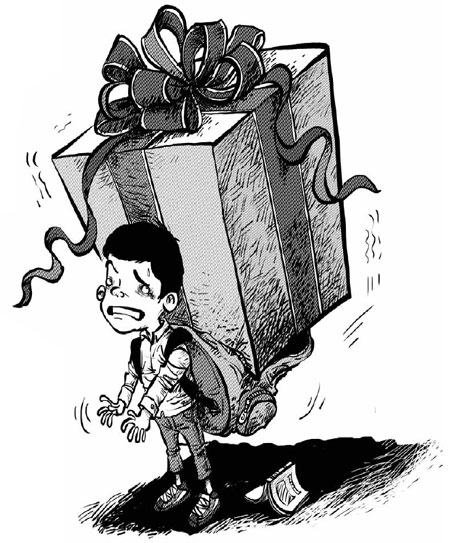
(China Daily USA 09/10/2013 page12)
Most Viewed
Editor's Picks

|

|

|

|

|

|
Today's Top News
Is Alibaba using a 'negotiating ploy' with HK?
Diplomacy gets under way on Korean front
China loses nearly 20% of grains
China's premier warns on Syria
Trending news across China
AIDS is biggest killer among infectious diseases
China vaults to world's 3rd-largest investor
War could derail global recovery
US Weekly

|

|



